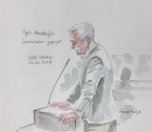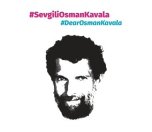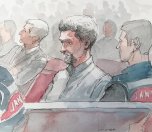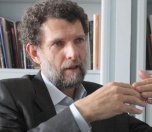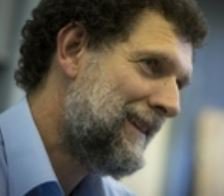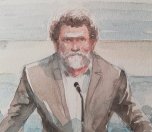* Photograph: Illustration by Murat Başol
Click to read the statement in Turkish
Charged with "attempting to overthrow the government of the Republic of Turkey" and being behind bars since November 1, 2017, rights defender and businessperson Osman Kavala had his first hearing in the Gezi trial on June 24-25, 2019. We are publishing some excerpts from the English version of his statement of defense that he presented on June 24:
CLICK - Yiğit Aksakoğlu to be Released on Probation, Arrest of Osman Kavala to Continue
***
"The accusations brought against me, which constitute the grounds for my pre-trial detention over the past twenty months, are based on a number of factually unfounded allegations against logic as well as presumptions that are not corroborated by evidence. Factual events have been distorted and a fantastic fiction has been constructed.
The indictment establishes that the Gezi Events were plotted by George Soros as an insurrection aiming to overthrow the Government, that in accordance with this plot the Gezi Events were financed by Soros, that I took part in the preparation phase of this plot, that I channelled Soros funds to the Gezi Events, that I acted as the leader and organiser of the Gezi Events.
The indictment reads as follows: "It has been understood that the entity led and coordinated by Mehmet Osman Kavala in our country,...prepared the ground for illegal structures and armed terrorist organisations to act; aimed to force the Government of the Republic of Turkey to resign by exerting pressure through this atmosphere and foreign countries; contemplated use of weapons and kept secret weapons readily available for preparing the ground for civil war, in case all the previous attempts would fail". This is an extremely degrading and humiliating accusation.
As can be seen in the case of our neighbours Iraq and Syria, civil wars are the worst disasters that could happen to any country as different segments of societies see one another as enemies and horrible crimes against humanity are commissioned. I did bear witness to the events that took place in our country at the end of 70s, which resembled a civil war, and I always remember them. Likewise, it is not possible for me to forget the coup d'état of 12 September 1980 and the oppression, persecution and torture inflicted during military rule.
Throughout my entire life, I have never ever sympathized with the idea of change of power through methods other than free elections. Since the early 1980s, when I became actively engaged in business, I have tried to realize projects and investments that I believed were important, and strived to contribute to a culture of democracy and to the cultural life of our country."
"Before I joined the Executive Board of the Open Society Foundation and founded Anadolu Kültür, both mentioned in the indictment, I was one of the founding members of the Turkish-Greek Friendship Association; the Thessaloniki-based Centre for Democracy and Reconciliation in Southeast Europe striving to contribute to peace and cooperation among the peoples in South East Europe; and Helsinki Citizens' Assembly, which was founded in our country in pursuit of similar objectives. While serving in these organisations, I strived to support projects that promote peace, dialogue and reconciliation among different segments of society. I called for the full enforcement and application of the legal and democratic norms of the Council of Europe, which Turkey is a founding member. I advocated integration in the European Union. Along with a group of individuals from civil society and academia, with whom I shared similar concerns, I tried to perform my duty as a citizen by issuing various press statements that warned against negative developments obstructing these processes, in particular the problematic practices of the judiciary."
"As a businessperson active in civil society, I have always publicly shared my opinion about social and political affairs in a transparent manner. In all my public statements concerning the activities I have carried out for the last 40 years, I have always subscribed to the principle of telling the truth without distorting it. I have never pursued a secret plan or an activity. I have never had any secret relations whatsoever with any organisation or community structure.
As can also be seen in the indictment, in none of my speeches and activities, one can find an element of secrecy; I have uttered no single word, made no single statement that is covert, that alludes to or includes coded messages about a secret attempt or plot, that is hard-to-understand. All my calls were made from the same mobile phone, all my correspondences were made from the same e-mail account; there are no deleted files in my computer that would contain sensitive information. As you may appreciate, this behaviour pattern does not correspond to that of a person who secretly works on an insurrection plot and manages a clandestine network. It is impossible to comprehend which activities or thoughts of mine could have led the prosecution to conclude that I directed such a sinister plot to prepare the ground for a coup and, even worse, to trigger civil war.
Twenty months ago, during my interrogation at the police station, I was not asked questions about the allegations regarding transfer of funds and connections with organisations as mentioned in the indictment. Therefore, I was not given the opportunity to explain these. During my interrogation, the only finding that was related to the Gezi Events was the photography exhibition organised in Brussels three months after the Gezi Events. The prosecutor felt no need to question me before preparing the indictment. I believe that the presumption about me being a criminal became definite even before my detention, and subsequently turned into a fixed conviction, totally out of touch with material evidence and tangible facts."
My alleged role in the preparation phase of the Gezi events
"It is understood, from my interrogation by the police, that they started to wiretap my phone as of 30.07.2012. However, the entirety of the conversations, presented as evidence for the Gezi-related charges, are the ones that took place on the dates after the Gezi protests broke out, spread to various cities and were supported by mass demonstrations. The indictment contains no evidence, finding or indication to prove that I plotted an insurrection or that I was aware of such a plot. I do not know any of the individuals affiliated with OTPOR / CANVAS organisations, which allegedly played an active role in the preparation phase of the Gezi Events; likewise, my only contact with Memet Ali Alabora, who allegedly took part in the preparation phase of the Events, is limited to two phone calls that took place days after the events unravelled."
Which organisation?
"The indictment alleges that, in order to execute this secret plot, I channelled Soros funds to the Gezi Events via the Open Society Foundation, where I acted as a member of the Executive Board, as well as Anadolu Kültür, where I act as the Chair of the Executive Board.
However, the organisation through which I allegedly plotted the insurrection is unclear. Neither these organisations, nor the others named in the indictment have been defined as the executors of the act of overthrowing the Government, they are not accused of these acts. It has been alleged that the plot to overthrow the Government and to foment chaos and turmoil for triggering civil war was executed by a clandestine structure, including myself as well as those individuals who infiltrated various organisations, which acted under the directions and guidance of Soros. The individuals who are standing trial in this particular case are accused of being members of this clandestine structure. There is no single piece of evidence, finding or indication to prove that these people, who work for different organisations and who are engaged in different activities, demonstrated a common will to advance a common goal; that they are in a systematic relation with one another; that they have received instructions from myself; and that they have acted under my instructions.
None of my speeches and conversations contain an expression that could be understood as an instruction to act. The allegation that a clandestine organisation made up of a number of people directed the protest actions attended by millions of people in 80 cities is a rather surreal one. The disproportionate nature of this allegation is also an indication of the fictitious construct of the indictment, which is devoid of any logical ground."
Fictitious construct of the indictment
"The allegations that the Gezi Events were a plot aiming to overthrow the government by means of triggering chaos, turmoil and civil war, and that this plot was masterminded and orchestrated by a clandestine structure consisting of individuals operating in various organisations bring to mind the fictitious construct in the Ergenekon case. This is not surprising given that almost the entire indictment is taken from the investigation file prepared by the Prosecutor and the Police Chief, both of whom are currently being accused of membership of FETÖ/PDY (Gulenist Terror Organisation/Parallel State Structure). The charges brought against the said Prosecutor include "establishing linkages between individuals by fictitious means, acting upon information and findings that do not contain any element of crime or legal data with respect to the laid charges".
Towards the end of the indictment, it is noted that the investigation file, from where information was sourced [for this particular case], "was initiated and directed by individuals who have been identified as FETÖ/PDY militants" and that all the evidence and the wire-tap records [ordered by the said individuals] were "revalued" (sic) for this particular case.
However, when one examines the annexes of the indictment, it becomes clear that not only the materials used as evidence including the wire-tap records but also the main construct of the indictment itself were taken from the investigation file prepared by these individuals.
We come to realize this fact due to the ''Analysis Report'' which was sent to Istanbul Directorate of Security on 15 June 2013 by the former Head of Anti-Smuggling and Organised Crime Department, who was detained on charges of FETÖ membership.The allegations that the Gezi Events were a premeditated plot, that the Occupy Turkey movement, OTPOR / CANVAS organisations as well as Memet Ali Alabora and his friends took part in the preparation phase of these events are copied verbatim from this particular report.
The very same Analysis Report, gives reference to an article written about me by an unknown author, allegedly accessible on the internet; without any concrete evidence it alleges that I acted as the "organiser and financer" [of the Gezi Events], that Alabora and his friends organised the events under my instructions, that I joined forces with George Soros and Ivan Marovic and acted with them towards the same goal. As it is well-known, the drafting of police reports using newspaper articles and building indictments upon these reports without the need for credible evidence was a common practice when the Gulenist entity was influential within the police and the judiciary.
Apparently, the prosecution adopted this fictitious construct and method as well, and alleged that I channelled Soros funds to the Gezi Events, without feeling the need to take my testimony. It seems that my position as a member of the Executive Board of the Open Society Foundation was considered sufficient grounds to allege that I plotted and financed the Gezi Events together with George Soros.
The allegation in the indictment that I channelled Soros funds to the Gezi Events has been treated as the core means by which a crime was committed, in other words the factual grounds for the charges brought against me. However, this does not eliminate the fact that this accusation is devoid of evidence. To the contrary, this situation makes things even more striking. Obviously, there needs to be material evidence in place for these allegations to be taken seriously. It is simply not possible for such a transfer of funds to take place without having any trace."
Allegations of transfer of funding
"As can be understood from all the financial information mentioned in the indictment as well as the report by the Financial Crimes Investigation Board (MASAK), there is not a single source of finance allocated to the Gezi Events through me. As can be seen in the 2013 annual report which we will present to the Court, all grants that Anadolu Kültür, whose board I chair, received from the Open Society Foundation were used to partially cover the costs of arts and culture activities, exhibition preparations and similar projects. Information regarding the projects and project budget items that these grants were used for can clearly be seen in the records of Anadolu Kültür Joint Stock Company.
All the accounts of Anadolu Kültür have also been audited. The report of the certified accountant regarding these accounts was previously presented to the Court. There is nothing unusual in the 2013 bank account transactions between Anadolu Kültür and the Open Society Foundation compared to previous years.
It is also clear to whom and for which projects the project support funds totalling 2.009.230 TL, that Anadolu Kültür received from various sources, was allocated in 2013. None of these are related to Gezi.
I served on the board of the Open Society Foundation in the same capacity as the other members, and never had special authorization to manage or transfer funds.
Constituting the factual grounds for the charges the Prosecutor's Office brought against me, the allegation that George Soros, by channelling funds through me, financed the Gezi Events, does not rest on any evidence, either about myself or Anadolu Kültür, where I act as the Chair of the Executive Board. There is no evidence that there were funds transferred to the Gezi Events through me.
The document dated 06.03.2018 explaining the report of the Financial Crimes Investigation Board (MASAK) sent to the Prosecution by Security Directorate clearly states that "the names of suspects within the scope of this investigation as well as those who underwent judicial proceedings as suspects in relation to the events subject to the investigation, did not coincide with the names involved in transfers of funds".
Even after the Financial Crimes Investigation Board (MASAK) report, confirming that there had been no transfer of funds from Anadolu Kültür Joint Stock Company to individuals related to the Gezi events, was included in the investigation file on 18.01.2018, and thus revealed that the accusations were devoid of any material evidence and factual grounds; there was an insistence on including such a claim in the fictitious construct of the indictment. Moreover, my requests for release were dismissed due to the reasoning that "there was no change in the status of the evidence [and the present situation which required detention]". This amounts to a grave violation of the law."
"It is clear that the fictitious construct of the indictment does not rely on factual grounds; it is based on presumptions that are not supported by evidence."
Alterations in the indictment
"There are serious alterations in the construct of the section that covers the activities implemented by Anadolu Kültür with funding from the Open Society Foundation, in particular the six activities that were listed in the indictment.
I was not even aware of the three of these listed activities; namely, Garaj İstanbul, Anadolu Jam and Baraka Forum meetings. The grounds on which it is alleged that these meetings were held through Anadolu Kültür remains a mystery. Likewise, Anadolu Kültür has never had any relation whatsoever with the activities of the Association for Dialogue and Reconciliation. As I have mentioned earlier, there was only one instance when, upon her request, I had a conversation with Ms. Germiyanoğlu, who carries out these activities. I did not take part in the meetings held by this organisation; neither I myself, nor Anadolu Kültür provided financial support to these meetings. The other two activities listed in this section, namely a new media outlet and documentary production, are project ideas that were never implemented. Even if those project ideas had been realized, it would not be possible for them to be used as grounds for the charges brought against me.
Anadolu Kültür, where I act as the Chair of the Executive Board, supports exhibition and film projects covering social events as well as social and political issues. Such works of art do not aim to cause "agitation" or to give messages calling for [protest] action. They strive to encourage their audience to debate and reflect on events, and help them approach social issues from a critical perspective. The photography exhibition opened at Depo and the photography exhibition organised in Brussels by the Carnegie Foundation, both on the Gezi Events, served this purpose.
As can be easily understood from the wire-tap records mentioned in the indictment, the film project featuring the Gezi Event, was not contemplated as an instrument for spreading the Gezi Events, but as a high-quality work of art to be screened at international festivals."
"Also the linkage established between the media outlet project, which was planned to be launched with my support amongst others, and the charges brought against me is completely unfounded. This project idea was initiated by journalists from print and broadcast media who lost their jobs. The idea was to set up an independent media outlet that would be run by journalists themselves and that would report objective news from a critical perspective. Since this media outlet would not be owned by an investor (it would be collectively owned by the journalists), there were several meetings held to discuss how to secure finance from various funding sources for the implementation of the project and I took part in some of these meetings. The meeting, where we discussed possible collaboration with the Guardian, one of the most prestigious newspapers in the world printed in the UK, clearly indicates what kind of a media outlet we were aspiring to.
The fact that these two specific activities, both of which were used as grounds for the charges brought against me, were not put into action, shows the disconnect between the accusation and the actual events. These examples also reveal the inconsistencies in the logic of the indictment. How could a media outlet project, allegedly conceived as the primary instrument for spreading the Gezi Events and yet unable to start owing to a lack of funding, be possibly funded by Soros ahead of time?
How does this relate to the allegation that Soros masterminded and financed the Gezi Events? None of these examples suggest that I myself or Anadolu Kültür provided funds to the Gezi Events. The allegation that I transferred funds to the Gezi Events is based on a presumption that George Soros financed the Gezi Events, which in turn is based on the assumption that certain articles and columns published in newspapers reflect the truth."
Fictitious construct about Soros
"The indictment alleges that "the influence of Soros over the Gezi Insurrection process has been widely debated both in the media and in academia; therefore, it has been understood that George Soros, the founder of the Open Society Foundations, has been influential during the Gezi Insurrection process that took place in our country, as was the case in the uprisings that took place in other countries". It is a fact that this allegation was made by some political actors and that it was covered by the media. Some of the newspapers also published columns and op-eds advancing the claim.
However, there has been no news article covering this matter based on objective data and investigation that consists of objective information. As I will summarise in a while, there has been no academic study, scientific journal or paper that mentioned such an allegation."
Arab Spring
"In order to support this allegation, the Prosecutor's Office used the argument that George Soros was an important actor in the popular uprisings in Arab countries, especially in Tunisia and Egypt, and that he provided substantial financial support to these processes. This argument is also baseless.
The assertion that George Soros was an important actor in the revolutionary events of Tunisia and Egypt is not substantiated by the political dynamics and developments in these countries. This assertion, which is not based on any research or news published in a respected newspaper, also reflects the belittling attitude towards the popular movements in these countries. In both countries, it was the domestic actors with a strong social base, and not external actors that played a determining role in the regime change processes."
"While discussing the popular movements in Tunisia and Egypt, it is important to keep in mind the fact that there had never been free elections in these countries. The fundamental factor behind the protests that paved the way for regime changes was the public demand for free elections; and it was thanks to this demand that the first free elections were held. In countries where democratic institutions are functioning, where elections are free, mass protests cannot lead to regime changes; they may merely open the way to a reconsideration of political decisions or policies."
Academic studies
"The Gezi Events have been analysed in many national and international academic studies. Although it has not been possible for me to cover them all, I had the chance to examine 35 papers published by prestigious journals and publishing houses.
I may summarise the most prominent points and findings of these assessments on the Gezi Events as follows:
- The significant diversity of the people who took part in the events, in terms of class, ethnic identity and political affiliation is a major emphasis in these studies.
- The Gezi Events are seen as a process whereby individuals, who considered they did not have a voice in matters affecting their daily lives and were underrepresented in the political arena, voiced their discontent and demands.
- Some academic studies conclude that the problems caused by neoliberal economic policies, as well as the fact that demands for social justice and democratic participation in urban life were disregarded and overshadowed by economic growth and competition, paved the way for the Gezi Events. In line with this perspective, the studies draw attention to the parallels between the reaction in Turkey against the projects that shrink the public space and commodify the urban areas on one hand, and on the other hand, the actions against neoliberalism that unravelled globally around the same time.
- The fact that communication channels did not enable certain activists or organisations to claim leadership of the process, as well as the constant information flows between participants enjoying equal positions and status, are the other important points underlined in these studies.
- A comprehensive empirical study examining the content of the twitter messages during the events as well as how these messages were used, suggests that the primary role of social media for users was in information dissemination to other participants in the demonstration, but that very few messages determined a general view of the events or thus could be said to have been aimed at directing them. Where twitter was used for the expression of personal opinion, many of the opinions were merely expressions of anger and frustration rather than ones which could be identified as aimed at directing the events.
- The main observation shared in these papers is that the Gezi Events broke out unexpectedly and in an unplanned manner.
- In terms of the way people got organised, all these studies underline the "horizontal", "decentralized" and "leaderless" characteristic of the protests.
None of the scientific and academic studies conducted so far have made a proposition that the Gezi Events were premeditated events organised with the support of foreign powers in order to overthrow the government."
Public function of parks
"Parks in city centres are places that people of different classes, professions and generations – without discrimination – can use free of charge to rest and socialise with others. They perform an important public function for everyone. For this reason, in different contexts there have been mass protest actions to protect them. For instance, the decision taken a month ago to rebuild an Orthodox cathedral in a park in the city of Yekaterinburg, Russia, which was demolished last May, led to protests with wide participation and a very tense atmosphere as a result of the harsh police attitude. However, in that case, protest actions resulted in a compromise following Putin's involvement, and the project for building a cathedral in the park was halted.
Parks in city centers are an essential part of the infrastructure of great importance for the city's inhabitants, and in contemporary democracies, these parks cannot be touched. Likewise, the Gezi Park is a very precious place, which serves university students, retirees, children working on the streets and Syrian migrants. When assessing the reaction of different segments of the society towards the construction project in Gezi Park, I think that this aspect of parks should also be taken into consideration."
The findings of the report by the Human Rights Institution of Turkey
"The way the Gezi Events were described in the indictment is rather different than the findings of previous assessments, scientific studies, the Gezi Park Report by the Human Rights Institution of Turkey (TİHK) and the court rulings in Gezi-related cases. Everyone accepts as fact that the first action related to the Gezi Park was the sit-in protest by a number of young people who put up tents in the park, and that the mass protests were triggered at a later stage when officials set fire to the tents and the construction machinery demolished the walls opposite the Divan Hotel to start excavation works.
The Government's submission to the European Court of Human Rights concerning my pre-trial detention, namely the ''Observations of the Government of the Republic of Turkey on the Admissibility and Merits concerning the application Kavala vs. Turkey'', states the following based on the findings of the report by the Human Rights Institution of Turkey (TİHK) dated October 2014: "Although in the beginning, the Gezi Park events unfolded due to environmental concerns and protesting against the use of force of police officers".The same report notes that "in the following period, the events became a stage for terrorist organisations (...) in many areas where demonstrations were held, members of terrorist organisations mixed with the demonstrators, opened posters of terrorist organisations, and terrorised the streets". In another submission to the European Court of Human Rights, namely "Observations of the Government of the Republic of Turkey on the Third Party Submissions", the Government made the following assessment: "Although it can be accepted that the demonstrations were peaceful in the beginning, there is compelling evidence that the said demonstrations were abused by illegal organisations in the following period."
The same submission notes that "between 28 May 2013 and 6 September 2013, a total of 5.532 demonstrations were held in 80 provinces attended by 3.611.208 people, and the law enforcement intervened in only 164 of these demonstrations which were considered unlawful". The submission also includes the following statement: "As from August of the same year, the incidents started losing traction and instead of demonstrations and street fights, the events continued in the forms of activities and press releases organised at local levels".
Another important point featured in the report by the Human Rights Institution of Turkey (TİHK) concerns the police intervention. The report notes that "the amount of pepper gas used during the [police] intervention to the Gezi Park Events and the method of use received heavy criticism", and shares the following findings:
- Even though the Guidelines on the Use of Lachrymator Agents, Weapons and Ammunition, issued by the Ministry of Interior in February 2008 stipulate that ''tear gas canisters cannot be launched by directly targeting the human body'', many people were injured as a result of being struck by gas canisters. These injuries point to a widespread practice of incorrect use of gas canisters.[1]
- During the Gezi Park events (...), much video footage and images that became publicly available show that the police continued to intervene against demonstrators who ran away, took shelter in workplaces and stores, and felt sick due to the exposure, and that many people including those who joined the demonstrations peacefully, and even those who had nothing to do with the demonstrations, got injured as a result of police misuse of the instruments of force, in particular pepper gas''.[2]
- "Even though the Guidelines on the Use of Lachrymator Agents, Weapons and Ammunition, issued by the Ministry of Interior, stipulates that the gas sprays shall be applied – in proportion to the resistance to police – only at a minimum distance of one meter and that lachrymator agents shall by no means be applied to those who cease resisting and attack, during the events, individuals who did not attack or resist the police were repeatedly gassed at a distance of under one meter and at close proximity".[3]
Along with these findings, the report concludes that "the intense exposure to pepper gas and other instruments of force caused rage against the law enforcement officers amongst the masses that took part in the Gezi Events, and this in turn triggered acts of violence and resulted in the continuation of the protests"[4].
The fact that the police intervention was such a significant contributing factor in the escalation of the protests indicates that the Gezi Events were not orchestrated in accordance with a premeditated plot. To prove the contrary, one would need to assert that there existed a mastermind premeditating the events, which entailed the adoption of such an intervention method by the police; and that this mastermind was also present during the preparation phase."
Political considerations
"The Gezi Events comprise a multitude of actions and activities undertaken by various groups and individuals in different cities and venues. Gathering and camping at the Gezi Park for the purpose of halting the construction project; protest actions against the use of force by security forces as well as the government decisions; open-air forum discussions and closed meetings held to reflect on all that happened during the process and to evaluate the social dynamics are altogether considered as the Gezi Events.
People who took part in these various activities during the Gezi Events may have different opinions about the goal and outcome of these events. It is quite understandable that there may also be differences in views and assessments about the events.
In a manner at odds with objective observations and academic studies, to describe the Gezi Events –disregarding all the differences mentioned – as an act of insurrection premeditated, orchestrated and guided by a certain organising actor is a political assessment. Political actors may make contradictory statements about social events; they may use certain terms and definitions by charging them with different connotations and meanings. However, the law must be above political convictions. While indicting suspects on charges of overthrowing the Government and fomenting chaos and turmoil to trigger civil war, prosecution needs to use objective benchmarks to establish whether the said actions have been conducted with such a motive.
It is not possible for abstract assessments such as ''preparing the ground for coup, chaos and turmoil'', which were also used in the Ergenekon case, to qualify as solid grounds for charges."
"One thing that is strikingly strange about the indictment is the fact that George Soros, who allegedly plotted and financed the insurrection and acted together with me in directing the clandestine structure towards executing that plot, is not among the suspects listed in the indictment, and that there has been no effort to take his testimony. This rather weird situation, as well as the ruptures and inconsistencies within the fictive construct which links the Gezi Events to Soros, make one think that the indictment was prepared not with the motive to establish the criminal offence and the offender, but rather in an attempt to justify my lengthy pre-trial detention, serving also the purpose of discrediting the protest of hundreds of thousands of our citizens who took part in the Gezi Events.
As I have tried to explain in my testimony and the petition where I provided additional information, upon Mr. Erdoğan's 4 February 2013 statement that ''Gezi Park will be replaced by a shopping mall'', I did make efforts to convince the government and the public about the fallacy of this project and to ensure that the Gezi Park remained and be preserved as a park. I did take part in the Taksim Platform. I was at the Gezi Park; I personally supported landscaping and planting activities at the park. Besides, as was also mentioned in the indictment, I took part in the meetings with Government officials. I cannot comprehend the logic of a person who talks to Government officials in an effort to find comprise between the protestors and the Government preparing the grounds for a coup by fomenting chaos and turmoil.
My sensitivity to the environment started a long time ago. I am one of the founding members of the Turkish Foundation for Combating Soil Erosion, for Reforestation and the Protection of Natural Habitats (TEMA), which was established in 1992. I served on the Executive Board of the organisation. Since Gezi Park is in the neighbourhood where I spent my youthhood, and since our office is right next to Gezi Park, it has been an integral part of my daily life over the years. The Gezi Park is not only a resting area for me, but it is also an important cultural heritage that enriches my life.
As I have already mentioned, apart from being a businessperson, I have been active in civil society for many years. Throughout this period, there were times when we cooperated with government agencies on various projects; there were also times when we criticised the practices of the governments and its agencies, when we tried to make a change in such practices.
I do firmly believe that campaigns, which build upon the public needs and demands and aim to dissuade governments from their faulty decisions, are legitimate civil society activities strengthening participatory democracy.
For instance, the campaign conducted by various civil society organisations, which I also took part in, significantly contributed to the Turkish Parliament's decision on 1 March 2003 not to pass the Government's resolution to allow the US forces to use our territory for occupying Iraq. Prevention of this decision benefited both the public and the Government. The preservation of the Gezi Park as a park must also be acknowledged as a decision in favour of the public interest. Up until today, the Gezi Park functioned as a public park without causing any disruption to the acts of the Government. To the contrary, preserving the Gezi Park as a park complies with the government policies that promote the opening of new parks and gardens.
Yet, certainly, I feel a deep pain for the lives that were lost and for the people who were injured during the Gezi Events. I also feel sorry about the material grievances suffered.
For all the reasons I have explained above, I would like to stress that I am no different than hundreds of thousands of people who got involved in the Gezi Events peacefully - both in terms of intent and action, and I demand my release and acquittal."
* This statement was taken from the "Free Osman Kavala" website
-
[1] Report on the Gezi Park Events, Human Rights Institution of Turkey, 2014, p. 63
[2] Ibid. p.74
[3] Ibid. p.80
[4] Ibid. p.63
(OK/SD)




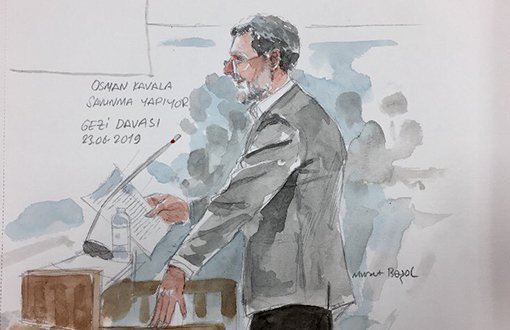
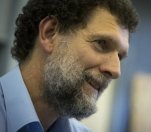
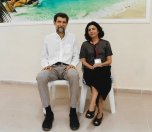

-132.jpg)
